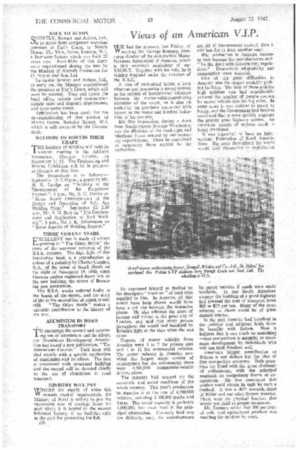Views of an American V.I.P.
Page 28

If you've noticed an error in this article please click here to report it so we can fix it.
WE had the pleasure, last Friday, of IT meeting Mr. George Romney, managing director of the Automobile Manufacturers Association of America, which is that country's equivalent of our S.14I.M.T. Together with his wife, he is visiting England under the auspices of the R.A.C.
A man of undoubted talent, a keen observer and possessing a strong interest in the subject of international relations between the motor-vehicle-producing countries of the world, he is also an authority on problems connected with labour in the motor and kindred industries of his country.
His first impression, during a drive from Southampton through Winchester, was the efficiency of the road signs and telephone boxes erected by our motoring organizations. These he considered as surpassing those erected by the authorities.
He expressed himself as thrilled by the descriptive " booklets " of road trips supplied to him. In America, all that would have been shown would have been a red line between the respective places. He also admired the scars of honour and valour in the great city of London, and said that every person throughout the world had benefited by Britain's fight at the time when she was alone.
Exports of motor vehicles from America were 1 in 7 for private cars and 1 in 11 for commercial vehicles. The motor industry in America provided the largest single service of employment for the community; there were 4,500,000 commercial-vehicle drivers alone.
The industry had stepped up the economic and social condition of the whole country. This year's production in America is at the rate of 4,700,000 vehicles, including 1,100,000 trucks and buses. The actual capacity is probably 6.000,000, but sheet steel is the principal obstruction. Formerly lead was the difficulty, until the manufacturers
got rid of Government control; then it will last for at least another year.
War production in America became so vast because the manufacturers said: "To the devil with Government regula tions." Democratic adaptability and competition were essential.
One of the great difficulties its America was the urgent needifor park ing facilities. The lack of these and the high accident rate had considerably reduced the number of people coming by motor vehicle into the big cities. In some cases it was quicker to travel by buggy, and the Government had become convinced that it must quickly augment the present great highway system. An interstate system of express roads is being developed.
It was important to have an International Federation of Road Associations, Big areas throughout the world would lend themselves to exploitation
by motor vehicles if roads were made available. In one South American country the building of a good highway had lowered the cost of transport from $85 to $12 per ton. Many of the areas referred to above could be of great mutual interest.
In the past America had benefited in the political and religious fields from its heredity with Britain. Now it believes that it can teach us something —that competition is essential to maximum development by individuals who will use their freedom well.
America's biggest contribution to Britain is not dollars but the idea of free competitive economy. Both countries are faced with the great challenge of collectivism, with the principal emphasis on compulsory forms of cooperation. He was convinced that neither could obtain its ends by such a method. It was a drift towards. those of Hitler and our other former enemies. There were no physical barriers that would not yield to proper treatment.
Mr. Romney. added that 100 percent. of milk and agricultural produce was reaching the markets by truck.
















































































